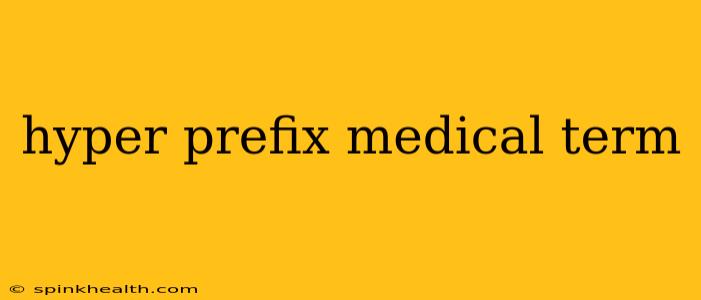The medical prefix "hyper-" is a powerful little word, signifying "over," "above," "excessive," or "beyond normal." It's a common sight in medical terminology, often indicating a condition where something is functioning at a higher-than-normal level or is present in excess. Think of it as the medical world's way of saying "too much." Let's dive into the fascinating world of hyper- prefixes and explore what they tell us about various medical conditions.
Imagine a doctor's office. The air crackles with the sound of stethoscopes and hushed conversations. Suddenly, a patient's chart flashes a familiar prefix: hyper. This small word can drastically change the course of diagnosis and treatment, signaling a need for immediate attention or a longer-term management plan. This is where understanding the meaning of "hyper-" becomes crucial, not just for medical professionals, but for anyone seeking to understand their own health or the health of their loved ones.
What Does "Hyper-" Mean in a Medical Context?
In simple terms, "hyper-" indicates an excess or abnormally high level of something. This "something" could be a substance in the body, a physiological function, or even a specific characteristic. It's a key indicator that something is operating outside its typical range. For example, "hypertension" refers to high blood pressure, where the force of blood against artery walls is excessively high. Similarly, "hyperglycemia" indicates high blood sugar levels.
Common Medical Terms Starting with "Hyper-"
Let's explore some common examples to further illustrate the meaning and usage of the "hyper-" prefix:
-
Hypertension: This is probably the most well-known example. It refers to high blood pressure, a significant risk factor for heart disease and stroke. The "hyper-" indicates that the blood pressure is above the normal range.
-
Hyperglycemia: This term denotes high blood sugar levels, often associated with diabetes. The "hyper-" signals an excessive amount of glucose in the bloodstream.
-
Hyperthyroidism: This condition involves an overactive thyroid gland, producing excessive thyroid hormones. The "hyper-" indicates overproduction and its related symptoms.
-
Hypercholesterolemia: This refers to high cholesterol levels in the blood. The "hyper-" signifies that cholesterol levels are above the healthy range.
-
Hyperkalemia: This condition indicates high levels of potassium in the blood. The "hyper-" clearly points to an excess of this essential electrolyte.
Frequently Asked Questions (PAAs) about the "Hyper-" Prefix
Now let's address some common questions surrounding the "hyper-" prefix in medical terminology.
What are some less common medical terms that use the "hyper-" prefix?
While the terms above are frequently encountered, the "hyper-" prefix is applied to a wide range of conditions. You might encounter terms like: hyperthermia (abnormally high body temperature), hypernatremia (high sodium levels in the blood), hyperuricemia (high uric acid levels), hyperventilation (rapid or deep breathing), and hyperopia (farsightedness). The possibilities are extensive, always highlighting an excessive condition.
How is the "hyper-" prefix used in diagnosis?
The "hyper-" prefix is a crucial diagnostic indicator. When a healthcare professional observes symptoms suggesting an excess of a particular substance or a hyperactive function, the "hyper-" prefix helps pinpoint the potential condition. For example, symptoms like increased heart rate, sweating, and weight loss might point toward hyperthyroidism.
What treatments are typically associated with conditions involving the "hyper-" prefix?
Treatments for "hyper-" conditions vary greatly depending on the specific condition. They might involve medication to lower blood pressure (in hypertension), insulin therapy to manage blood sugar (in hyperglycemia), or lifestyle changes such as diet and exercise. Precise treatment plans are tailored to each patient and specific condition.
Can "hyper-" conditions be prevented?
The prevention of "hyper-" conditions often involves lifestyle modifications. Maintaining a healthy diet, regular exercise, and managing stress are crucial for preventing many conditions. Regular check-ups and screenings can also play a critical role in early detection and intervention.
Understanding the "hyper-" prefix is more than just memorizing a definition; it's about grasping a crucial component of medical language. It's a window into a broader understanding of the human body and the complexities of health and illness. This knowledge empowers individuals to become more active participants in their healthcare journey and to engage in more informed discussions with their healthcare providers.

